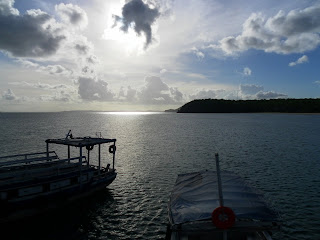This past week I spent three days on fishing island in the Bahia de Todos os Santos called Ilha de Mare. We traveled one hour to the boat dock outside of the city and then took about a one and a half hour boat ride to the beautiful island as the sun was setting. Going to the island was like going to another world in comparison to the city of Salvador, even though Salvador’s skyscrapers stuck out in the distance. The people on the island live in about 9 different povoados, or smaller villages, which are accessed by boat and canoe. I stayed with a very generous family on the largest povoado called Praia Grande. The vegetation is dense with a lot of mango and coconut trees. There are no cars so boats and donkeys are the means of transport. Life is rather primitive in comparison to the modern city. The people of Ilha de Mare support themselves on the sale of crafts like woven baskets, fishing, and shell fishing (mostly crabbing). Many of the people are also direct descendants of slaves and some of the older inhabitants can still communicated in African dialects.
Over the three days, I spent a lot of time asking questions, observing and listening to try and get a grasp of the lifestyle that is so different from anything I have ever known. Development has come very slowly to the island and each improvement has been a fight. Water and electricity are fairly recent additions and up until recently people relied on drinking rainwater and carrying well water for long distances on their heads. They may have telephones and cell service but there isn’t even a school for those students past the fourth grade. Students after fourth grade must make the one and a half hour boat ride at 5 in the morning to the city. Only in the past four years has the government paid transportation to students. The majority of people that I spoke with don’t have more than fourth grade education. The government has promised a school on the island but most think it will never happen due to the lack of resources and teachers.
One of the greatest developments on the island is the health post that came three years ago. The health post is open from 10 to 4 from Monday through Friday and has greatly improved the heath of the people. Sadly, the majority of health care services can only be found in Salvador. I heard a lot of stories about women giving birth in canoes due to the 4 hour trip to the hospital. It can be very dangerous and women have lost their lives and their babies for lack of a maternity clinic on the island and a permanent nurse of doctor. All medical emergencies and many prescription fills still require the long trip to the city as well.
Ilha de Mare translates to Island of the Tides. It is one of the many islands in the Reconcavo and considered the rural part of Salvador. Something that was so impressive and refreshing in a sense is seeing nature’s role in controlling these people’s lives. I live in the world where technology and development have worked primarily against nature to try and beat it and gain profit from it at its expense. But on the island, their daily lives are ruled by the tides and the weather. They rely on this balance and respect it. Whether they have water, electricity, food, and work is all ruled by nature. Schedules of fishing, crab hunting, and traveling are determined by the tides. The citizens of the island have not tried to conquer nature but work with it, knowing that working with nature is their way of getting by. Sadly, modernization is trying to change this balance of the people and nature on the island. PetrobBras, the Brazilian oil company, found oil on the island and has several large plants. As a result, the water, land and air are becoming heavily contaminated. Fish and shellfish are dying and the ocean is becoming a toxic environment. Without fish and shellfish, these people will lose their livelihoods. The worst part is that PetroBras is paying large amounts of money to Salvador for its access to the Island due to the fact that the island is technically part of Salvador, but the island is not receiving any of this money from Salvador. Their lifestyle that has worked harmoniously with nature since before explorers came to Brazil at the beginning of 1500 is being threatened by outside forces. The people are beginning to organize and a fight will soon follow.





No comments:
Post a Comment